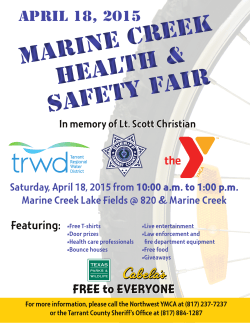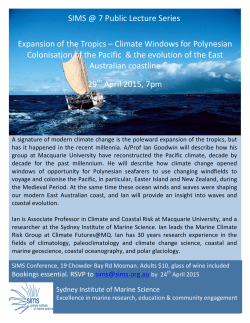
Marine data and information powering Blue Growth
EuropeanMaritimeDayWorkshop10 "MarinedataandinformationpoweringBlueGrowth” Thursday28May2015‐11.00‐12.30 Room:TriantiHall MeetingvenueAthensConcertHall‐Vas.SofiasAvenueandKokkaliSt.11521Athens,Greece Organisers: European Marine Observation and Data Network (EMODnet), Mercator Ocean, Euro‐Mediterranean Center on Climate Change, European Consortium for Global Ocean Observing System, European Network of Maritime Clusters, Istituto Nazionale di Geofisica e Vulcanologia,LinksManagementandTechnologyS.p.A. The workshop will focus on key elements of the marine knowledge value chain: from observation and collection of marine and coastal data to information, products and services for intermediate and end‐users. The aim is to attract and demonstrate to the audience, in particular stakeholders from maritime industries, the importance of marine and coastal observation and data management as well as the following development of marinecoreanddownstreamservicesforend‐users,ascriticalcomponentstopromoteand implementtheMarineKnowledge2020strategy. Theworkshopwillconsistoftwopartsjointlyaddressingthefourmaincomponentsofthe MarineKnowledgevaluechaincovering(1)MarineObservationandData(2)MarineCore Services(3)MarineDownstreamServices(4)End‐users. Moderator:MRPHILWEAVER,ChairoftheEuropeanMarineObservationandDataNetwork– EMODnetSteeringCommittee Part1Introductionandillustrationofthecoreconceptsandactorsinvolvedinthefirstthree componentsofthemarineknowledgevaluechain. Speakers: MRALESSANDROPITITTO, COGEA,CoordinatorofEMODnetHumanActivities:Therelevanceof freeaccesstointeroperabledataonhumanactivitiesintheEuropeanmarineandcoastal environment. MR.GAËLMORVAN,HeadoftheBathymetryDepartment,,FrenchHydrographicOffice(SHOM): Coastal Mapping: Towards a prototype digital map of Europe’s coastal zone for inclusion in EMODnet MRPIERREBAHUREL,DirectorGeneralMercatorOcean,entrustedentityforimplementingthe CopernicusMarineService:TheCopernicusMarineEnvironmentMonitoringService MR GLENN NOLAN, Secretary General of EuroGOOS AIBSL: DownstreamactivitiesofEuroGOOS Associationmembers MRANTONIOGUARNIERI(INGV)andMSPALMALISAMARRA(LinksS.p.A.):Marineservicesin theMediterraneanSea:TESSAandEMODnetMedSeaCheckpointprojects Part2Guidedpaneldiscussionfocusingonperspectivesfromend‐users(withtestimoniesfrom representativesfromkeyusercommunitiesandinterventionsfromtheaudience) Introduction by MR PAUL MARCEUL, Secretary General, European Network of Maritime Clusters(ENMC):Expectationsandneedsofend‐usersintermsofqualityandservice Key messages The Workshop Organisers wish to convey following key take home messages 1. Coastal regions and cities are key drivers of the Blue Economy. Major players of the European Marine and Maritime sectors bring value to coastal regions by interacting in an end‐to‐end value chain: Marine Observation and Data ‐> Marine Core Services ‐> Marine Downstream Services ‐> End users in coastal regions. 2. Data from the marine and coastal environment are a valuable asset. Rapid access to reliable and accurate marine data and information is vital to obtain the knowledge necessary to address threats to the marine environment, in the development of policies and legislation to protect vulnerable areas of our coasts and oceans, in understanding trends and in forecasting future changes. Likewise, better quality and more easily accessible marine and coastal data is a prerequisite for innovation and further sustainable economic development or ‘blue growth’. 3. As two rings of a chain, the Copernicus marine core service and downstream services are bound for delivering state‐of‐the‐art services to end‐users over the coastal areas, represented during the workshop by the Maritime Clusters. 4. As an international non‐profit organisation dedicated to promote operational oceanography, the European Consortium for Global Ocean Observing System (EuroGOOS) acts as a glue across the entire marine knowledge value chain by strengthening core elements from upstream processes (improving data gathering and observations including through the design of a European Ocean Observing System or EOOS), core and downstream services (stimulating the development of appropriate services) to end‐users (developing direct links and transfer to the end‐users). 5. Blue Growth activities (e.g. fisheries and aquaculture, sustainable shipping, renewable energy, maritime safety) are facilitated by the use of sea situational awareness services and of trustworthy monitoring data. The projects TESSA and EMODnet MedSea Checkpoint operate in this sense, in the production of decision support systems and in the assessment of the quality of the monitoring data at Mediterranean Sea basin level, respectively. The experience presented in the Mediterranean Sea demonstrates the effectiveness of the marine knowledge value chain, from the identification and filling of monitoring data gaps to the development and application of operational oceanography products and services (e.g. for ship routing, oil spill, search and rescue). Workshop Organisers European Marine Data and Observation Network (EMODnet) is a consortium of organisations assembling European marine data, products and metadata to make fragmented data resource more available to public and private users, and to facilitate investment in sustainable coastal and offshore activities through improved access to quality‐assured, standardised and harmonised marine data which are interoperable and free of restrictions on use. Mercator Ocean, the French centre for analysis and forecasting of the global ocean, acts as entrusted entity implementing the Copernicus Marine Service. European Consortium for Global Ocean Observing System (EuroGOOS) is an International non‐profit association of national governmental agencies and research organisations, committed to European‐ scale operational oceanography. The 37 members from 18 European countries provide operational downstream services and are active in marine monitoring and marine research EuroGOOS aims to improve the quality and cost effectiveness in the provision of oceanographic products and services. The European Network of Maritime Clusters (ENMC) is a confederation of Clusters or equivalent structures, preparing a roadmap to establish a framework for future common targeted actions in the maritime sector among 17 countries. All of the member organizations are, or tend to be, cross‐ industry organizations gathering all or part of the maritime subsectors of their countries. The Euro‐Mediterranean Center on Climate Change or Centro Euro‐Mediterraneo sui Cambiamenti Climatici (CMCC) is a non‐profit research institution (www.cmcc.it), whose mission is to investigate and model the climate system and its interactions with society to provide reliable, rigorous and timely scientific results and stimulate sustainable growth, protect the environment, and develop science driven adaptation and mitigation policies. CMCC operational oceanography team is dedicated to the development and production of short‐term ocean forecasts, modeling and applications in the field of maritime safety and coastal environment. The Istituto Nazionale di Geofisica e Vulcanologia (INGV) is an independent organization working under the supervision of the Italian Ministry of Education, University and Research (www.ingv.it). Through the Division of Bologna INGV is responsible for the Mediterranean monitoring and forecasting activities, both at national and European level, within the Project RITMARE and the Copernicus Marine Service, respectively. Links Management and Technology S.p.A. (Links S.p.A.) is a consultancy providing management consulting and technology services and solutions for creating value for public and private customers, through the application of emerging technologies designed for the finance sector, for the public as well as SME. Links is the coordinator of TESSA project and of a number of initiatives about sea situational awareness and security at sea
© Copyright 2025









